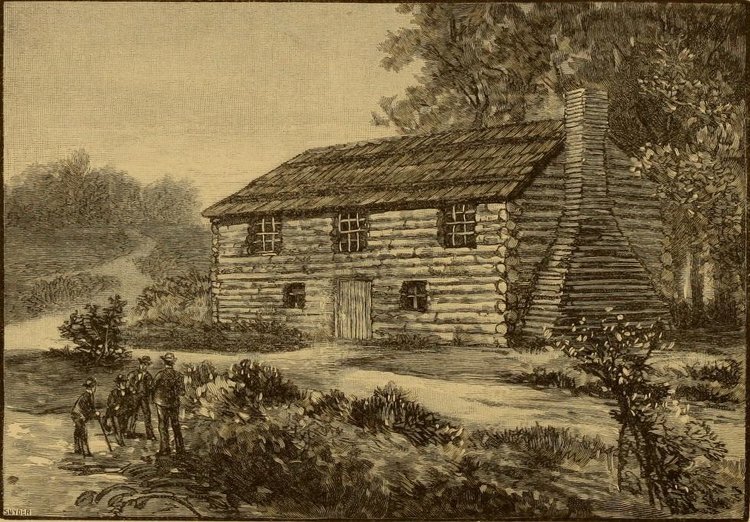Receive our blog posts in your email by filling out the form at the bottom of this page.
The names of Alexander Craighead (1707-1766) — “the spiritual father of the Mecklenburg Declaration of Independence” — and David Caldwell (1725-1824) — of the Caldwell Log College are well known to both North Carolinians and to students of Presbyterian church history. Less well-known, but of great significance to civil and ecclesiastical history, is a woman with ties to both men: Rachel Brown Craighead Caldwell (1742-1825), daughter of Alexander and wife of David.
Alexander was a firebrand Presbyterian — the first Covenanter minister in America — of Scots-Irish descent. He and his family moved from Pennsylvania to Virginia (he was a founding member of Hanover Presbytery) to North Carolina. Rachel was born in Lancaster County, Pennsylvania just a year before her father renewed the Scottish covenants at Middle Octorara in 1743. Later, Rachel would sometimes speak of her experience growing up in western Virginia during the French and Indian War of the 1750s, as a period fraught with danger. At one point, after General Braddock’s 1755 defeat, Indians were coming in the front door as the family was exiting the rear door.
David, who was older, first met Rachel while attending services led by Alexander; she was four years old at the time. They met again some years later and were married in 1766, the year her father passed away, when David was 41 and Rachel was 24. Alexander had four daughters and two sons, and believed strongly in educating all of his children thoroughly. Rachel was at once devout, intelligent and compassionate, all qualities which served her family and her husband’s students well in the years which followed.
In 1767, the Caldwells settled on land near what is now Greensboro, North Carolina. They built a homestead, a farm and an academy, which became known as the Caldwell Log College. This school became a nursery, as it were, for both the church and state. Richard P. Plumer wrote (Charlotte and the American Revolution: Reverend Alexander Craighead, the Mecklenburg Declaration & the Foothills Fight for Independence, p. 67):
Caldwell Academy, which Reverend Caldwell began in 1767, became the most well known and longest lasting of any of the thirty-three Presbyterian log colleges that were established before the Revolutionary War. At the time the academy closed, almost all of the Presbyterian ministers in the South were either graduates of or had taught at the college, about 135 ministers in all. Five governors, fifty U.S. senators and congressmen and numerous doctors had attended Caldwell Academy. Rachel got to know all the students at the academy, was extremely kind to them and instructed them in every way possible on their salvation. It was said that ‘David Caldwell made them scholars, but Mrs. Caldwell made them preachers.’
James McGready, the noted Presbyterian revivalist, John M. Morehead, North Carolina governor, and Archibald Murphey, “the Father of Education in North Carolina,” were among those future leaders who studied there. As alluded to above, Rachel Caldwell had a particular gift for encouraging the students and their pastoral studies.
Passionate for the gospel, she was also compassionate towards those in need. David Caldwell, who helped write part of the 1776 North Carolina state constitution, was forced with his family to leave his homestead for part of the War of American Independence (British General Cornwallis placed a £200 bounty on Caldwell’s head, his house was plundered, his library and livestock destroyed, and his family was mistreated by British soldiers). Before and during the 1781 Battle of Guilford Courthouse, Caldwell was forced to hide in a nearby swamp as the British used his property as a staging ground for the Battle of Guilford Courthouse. After the battle, the Caldwells returned and David — who was not only a minister and an educator, but also a physician — and Rachel both tended to the wounds of soldiers lying on the field.
David and Rachel were married almost 60 years, and had thirteen children, some of whom died in infancy. Nine grew to maturity, and at least three of the boys became ministers. Much like Catherine Tennent, who was mother not only to her sons, also students at the original Log College, but also the other students — Thomas Murphy described her as “the real founder of the Log College” — Rachel Caldwell was mother not only to her own children but also to the many students at the Caldwell Log College. A pioneer Presbyterian preacher’s daughter and a teacher’s wife, she not only served her family and the Caldwell academy, but also the church and the cause of liberty in America. She died a year after her husband and their son, Rev. Samuel Craighead Caldwell, both passed away. Rachel and David were laid to rest side by side at the Buffalo Presbyterian Church Cemetery in Greensboro. The David and Rachel Caldwell Historical Center in Greensboro honors their sacrifices and contributions to North Carolina today and keeps alive their memory.
We conclude this brief notice of an American heroine with the words of E.W. Caruthers, who made these remarks in his sketch of the life of David Caldwell:









